At Chmura Connect 19—The Labor Force Awakens, we gathered our clients together to network, learn from incredible speakers, get JobsEQ FIT Certified, and share best practices. We also had a lot of fun along the way.
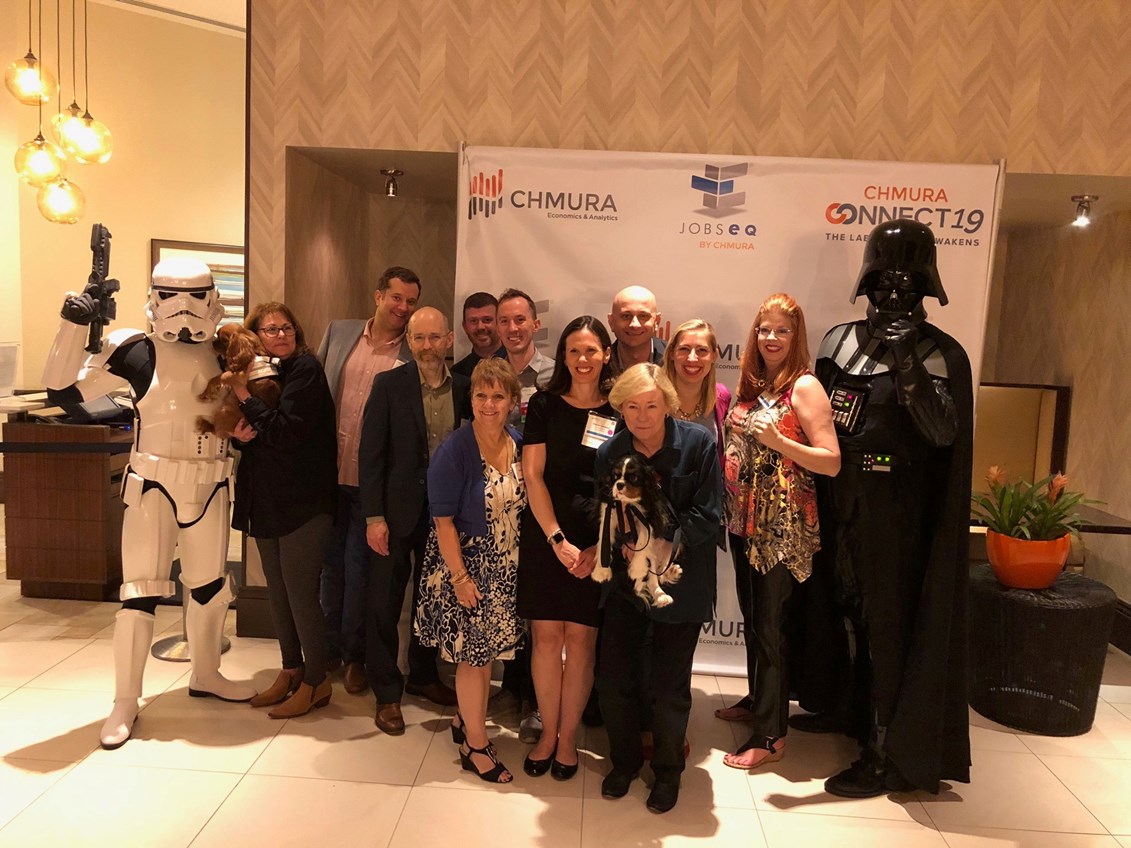
Kickoff
On Sunday we kicked off the conference with burgers and hot dogs grilled by our CEO and Founder Dr. Chris Chmura along with Mark Hays from DCCCD.


Certification
On Monday we got down to business with our JobsEQ FIT Certification program. Our clients learned how to use multiple JobsEQ analytics to tell their region’s story. They also investigated how they can use data to craft strategies to promote economic development, foster regional talent, and design educational programs.
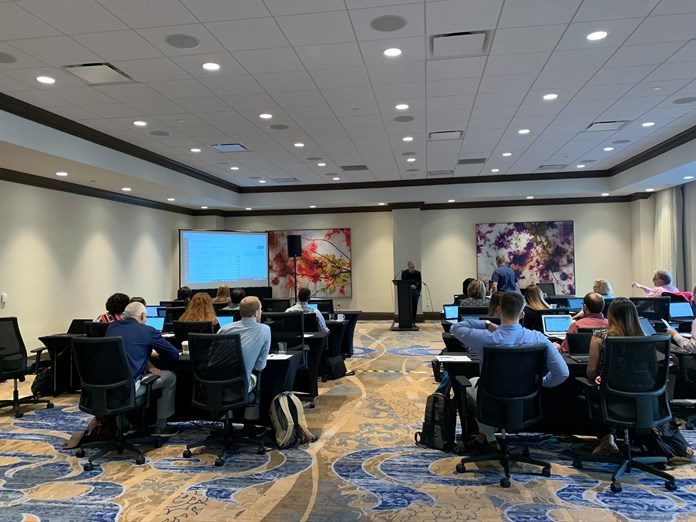
Welcome to Our Galaxy!
Our two mystery guests, Darth Vader and a stormtrooper, lit up our opening reception! Our staff and clients enjoyed dancing and taking pictures with the two villains.
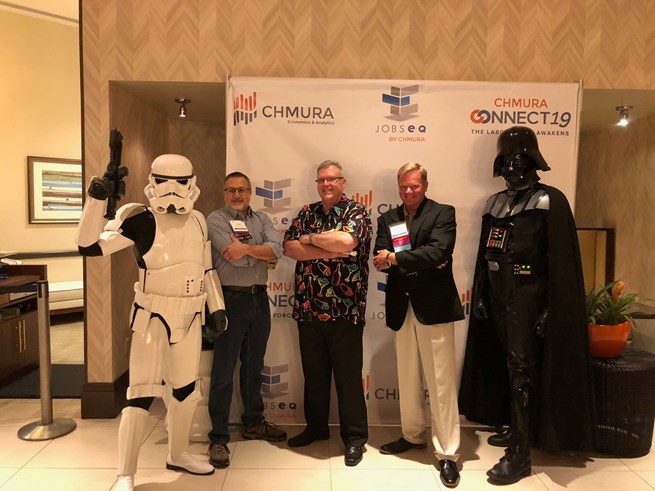

Usually quite shy Jr. Data Fetcher Duncan took an especial liking to Darth Vader!

Your Goal Affects Your Path
Our CEO Chris Chmura took the stage first; she showed that to design an effective development strategy, you must first determine your end goal. For example, an economic developer who wants to increase average wages in his or her region will try to attract different industries than a developer who desires to increase regional employment. Chris also showed how unstructured jobs postings data (RTI) complements structured data by allowing us to look at wages and specific skills.
The Skills Gap is a Moving Target
Reg Javier, Deputy Executive Officer of San Bernardino County, emphasized that because industry needs constantly change, we need to be proactive in developing a labor force, meeting not only the needs of today but anticipating the business needs of tomorrow. Only by presenting dynamic solutions can we close the “skills gap.” These dynamic solutions require predictive industry data, which are available through JobsEQ. Further, economic developers should see the availability and quality of their labor force as the key economic driver of their region. Chmura is excited to partner with San Bernardino County on development efforts including this 2017 Annual Report.
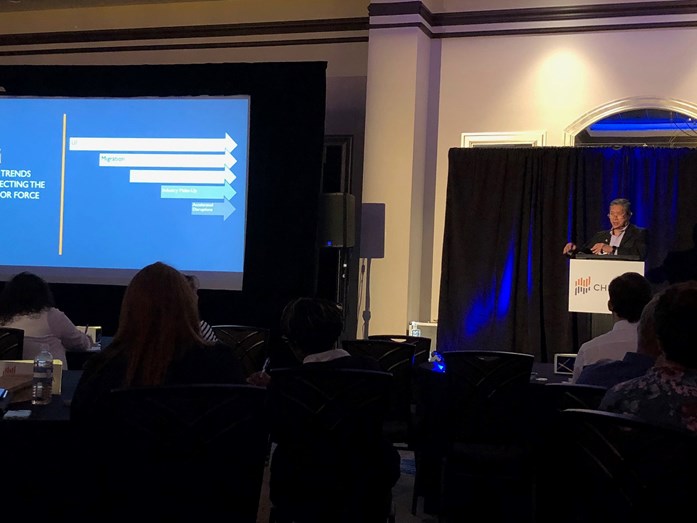
Badges and Presenting Data
In our breakout sessions we learned how to manipulate and present data. Our Chief Quality Officer, Greg Chmura, led a badge session on RTI jobs postings data; Product Manager, Mike Kyffin, taught our clients how to make powerful maps in JobsEQ; and Dr. Bryan Shelly gave concrete tips on how to present your data to the boss.

"Hey, this is really user-friendly!"
Photo and caption credit: Caroline Portlock, Workforce Director of the Workforce Board of Will County
How Labor Data Impacts Real Estate Decisions
Marianne Skorupski, Director of Research & Marketing at Newmark Knight Frank showed how she uses labor data to evaluate how any move will impact a company’s current and potential employees. Echoing both Reg and Chris, she emphasized future planning and explained that she examines a client’s business model to ensure the company’s growth in a new region.
How To Design a Program
Our Economics Training Specialist, Wesley Michael, taught our clients how to use the powerful and flexible Data Explorer tool to answer their questions. Meanwhile, Chmura’s Director of Business Development, Kyle West, discussed how to analyze program gaps by uniting JobsEQ data and other on-the-ground information; other sources of valuable intel include business surveys, focus groups, and subject matter experts. Finally, Enterprise Florida’s Research Director Trent Shaw performed an invaluable live demo where he used a case study to discover talent, determine the fit of high-tech industries, and explore the pipeline to build a labor argument.
Autonomy is the Enemy
Dr. Joe May, Chancellor of the Dallas County Community College District, opened his speech by declaring that autonomy is the enemy. No one organization can make a community thrive. To change our communities we must partner with other organizations, including faith-based organizations, charities, educational institutions, and workforce boards. Moreover, colleges exist to serve the needs of others. If colleges are not increasing the wealth of its students and are not training students for the workplace, colleges are not fulfilling their mandate.
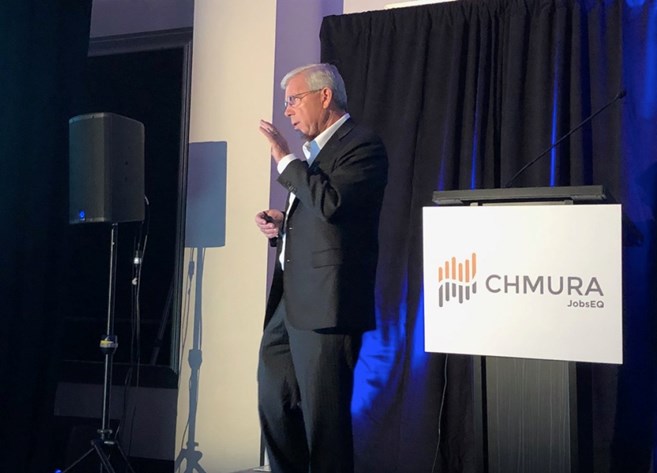
Be the Voice of Truth
Gray Swoope is President and CEO of VisionFirst Advisors, an economic development consulting firm that advises on site selection, economic development strategy, and data-driven marketing. Gray argued that in this age of partisan politics, people looking to prosper their communities need to use and interpret data to “speak truth” in our communities. He also noted that when a business prospect visits your region, they have already formed their first impression of your region based on labor market data.
Using Data to Identify Peer Regions and Develop a Concrete Plan
For the past two years, Chmura has worked with the Evansville Regional Business Committee and a group of regional stakeholders – including different economic development organizations, a foundation, and the United Way – to develop a set of trackable “indicators” to help measure the region’s progress in terms of demographics, employment and wage growth, educational attainment, and community wellbeing. In this presentation, Chris Chmura and Pete Paradossi, CEO of the Evansville RBC, teamed up to describe (1) how Chmura chose peer regions and aspirational peer for Evansville, (2) how Chmura quantified Evansville’s areas of improvement through measurable indicators, and (3) how Evansville has used these indicators to develop a strategic plan, Talent 2025.
Rapidly Available Data for Rapid Response
Tim H. Samuels from DCCCD’s Ascend Institute explained how Ascend is charged with being a "rapid response" service delivery unit, with its forte being to customize business solutions in a fast track, accelerated fashion. His session explained how the Ascend Institute uses data to drive decisions, particularly in closing the "middle skills" gaps across the North Texas region.
After a quick break for lightsaber popsicles, we continued our learning:

Esri: Put Data in Context, Please
Helen Thompson, leader of Global Marketing Strategy for Esri, discussed the power of data to tell a story that impacts public policy. She argued that the best leaders are unafraid of data, willing to learn, and able to translate data insights into change. Instead of using raw facts, economic developers and public policy leaders should put data in context to tell the story of their community. Context allows civic leaders to differentiate their community.
Workforce Jedi Council
In a spirited discussion, President Lori Strumpf from Strumpf Associates: Center for Strategic Change challenged workforce boards to streamline their internal communications and partnerships with business advisory boards, focus on skill training to match industry needs, and expand affordable continued learning opportunities. Reg Javier noted that due to rapid technological changes, businesses will have to help train their workers for the skills they need. Mark Mattke, CEO of Spokane Workforce Council, agreed that workforce boards need to make continued learning more affordable. Workforce professionals should approach community members humbly, without assuming they know what workers need.
Dancing the Night Away
After three days of learning, we let our hair down at the Caribbean Cantina poolside reception. The live music was impossible to resist, and soon the dance floor was packed! Thank you all for a wonderful week.


See you next year at The Ritz-Carlton in Cleveland, September 27-October 1! Stay tuned, because registrations will be open soon.
Want more photos? View our Chmura Connect 19 album on our Facebook page.